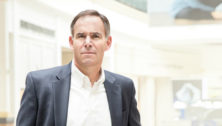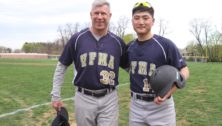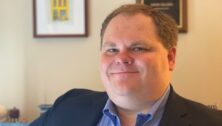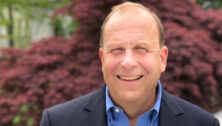Montgomery County Leadership: Chris Wiseman, Executive Director, Habitat for Humanity of Chester County
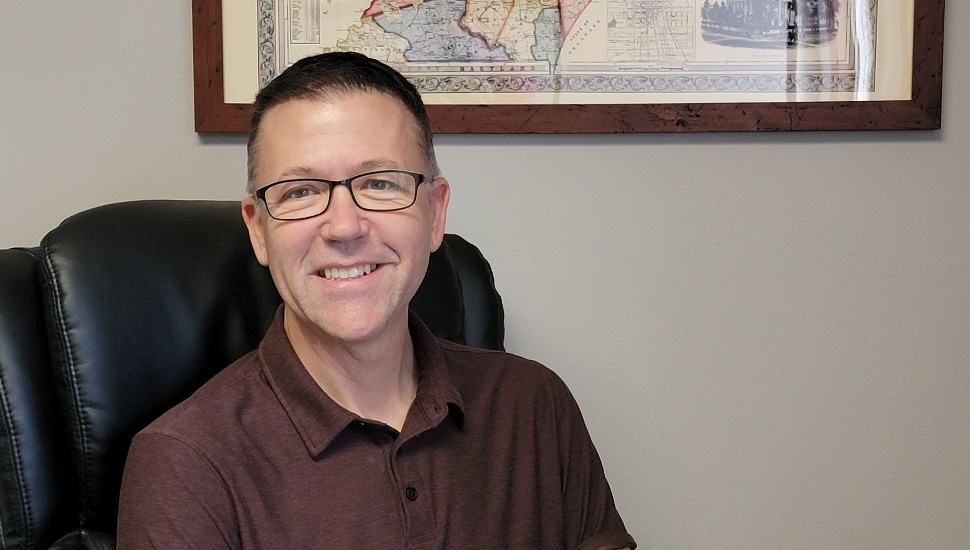
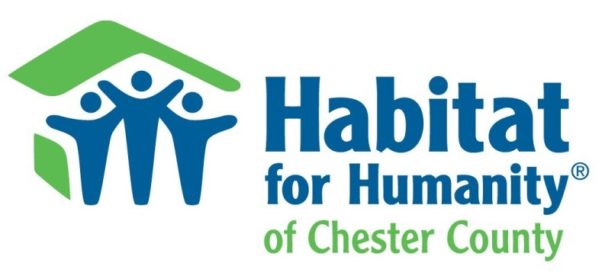
Chris Wiseman, Executive Director of Habitat for Humanity of Chester County, grew up in West Virginia and North Carolina. He recalled adventures with a German shepherd that he called his best friend and found surprising success after joining his high school swim team as a senior, which led to a college scholarship.
Swimming also helped him find his first job as a lifeguard at the YMCA, which turned into two-plus decades working for the Y, including as the Executive Director of the Brandywine YMCA. Now, as the Executive Director of Habitat for Humanity, he’s led three years of exponential growth, including three communities of homes in development and a new ReStore.
…..
Where were you born and where did you grow up?
I was born an only child in Charleston, West Virginia, but I moved when I was little to Charlotte, North Carolina. I had a big extended family, so I had lots of cousins nearby who were like brothers and sisters. In some ways, being an only child probably helped me deal with the fact that I grew up poor, Appalachian poor. I was never spoiled as an only child because we didn’t have the means to spoil.
What did your parents do?
My dad worked in construction, so some of that is in my blood. My mom worked different jobs, but she mostly worked in the corporate office for Harris-Teeter, which is one of the big grocery store chains there.
What other memories stay with you from childhood?
My best friend growing up was this giant white German shepherd named Eric. When I was little and kind of a hillbilly in West Virginia, we roamed the countryside. He was always my protector. There was a terrifying moment when I got jumped by a couple of pit bulls, and he took them both out. German shepherds are very smart and loyal dogs, and that one attached himself to me as a little kid.
…..
Did you play any sports in high school?
I was a soccer player, at first. I was a pretty good goalie, but I played behind the number one goalie in North Carolina, so I didn’t get to play much.
My senior year, out of nowhere, I picked up swimming, and I was a really good swimmer. I did the 100-meter and 50-meter. I got a scholarship to UNC Charlotte.
This was early in their swimming prowess. I was in there for a year and a half, and then they stopped the program. The coach left and the program went away, as did my scholarship.
How did you make the leap from soccer to swimming?
The swim team was new at my school. A couple of new schools had been built in Charlotte with swimming pools, and they would ship us over to that school. I didn’t know how good I was. I’ve got great lung capacity, so the running joke with my coaches was that I never breathe.
What about jobs in high school?
I started working at the YMCA in high school, which ended up being a 25-year career. I started there as a lifeguard, then a swim instructor. As a swim instructor, I found out I liked working with kids. I moved into day camp and became the Teen Director.
What did you take from that experience at the Y that not only kept you there but still informs how you work today?
Even early on, as a lifeguard, it’s a serious role. I had rescues; I had a time when I had to do CPR on someone. I was 17 and someone went down in the locker room, not breathing. I came in, performed rescue breaths, and brought her back. That was a game-changer.
But even bigger than that was when I started working with kids when I went into swim instruction. I just loved the connection with that group. Then I realized a lot of the kids that were coming to the Y wouldn’t have the means to come unless there was financial assistance, so I started helping them fundraise to make sure more and more kids could come and be safe around the water. At the very core of that was the realization that there are missions you can work with and actually make a difference in somebody’s life.
What music floated your boat when you were growing up?
To this day, I love most music from around the 1970’s to the early 80s – everything classic rock. That’s my parents’ influence. They were both young when they had me, and the ‘70s rock era just stuck. Growing up, my first album was the Eagles. There’s not a bad Eagles song. And James Taylor was always huge in our house.
You ended up going to UNC Charlotte – why there?
Well, all through high school, I was also in ROTC and was convinced I was going to go to The Citadel in South Carolina. I’d been accepted and was ready to go. In the summer, I freaked out and was like, “I don’t want to be in the military.”
I was the commander of our ROTC, and ran the drill team – I was all in. And then, all of a sudden, I wanted to expand to do something different.
I had a scholarship that was lingering from UNC Charlotte. Later, they retracted that when the swimming program ended at the end of my sophomore year, so I had to figure out how to pay for the rest of college, and I joined the Air National Guard.
Was UNC Charlotte a good choice for you, looking back?
I don’t think I was ready to go far away. It was nice to be close to home and have those connections.
I went through several iterations of what I was going to do, even while I was in school. My time working with the Y kept pulling me back towards that. I started college thinking I was going to be an engineer. I have an associate’s degree through the military. I was a meteorologist in the Air Force. I have a minor in physics, a minor in computer science, and I ended up with an English degree to teach high school.
When you got done with college, who were the people who saw something special in you?
Her name’s was Alex. She was a young director, probably only a few years older than I was, at the Y in Charlotte. She knew I was moving towards becoming a teacher but said, “Listen, you’ve got a career at the Y. You get it on every level. You can always go back and teach, that’s not going to go away, but you should give this a shot.”
What do you think she saw in you?
She would probably tell the story where – we got 12 inches of snow in Charlotte, which shut the city down for two weeks. I made it in every day because I knew there were some kids who had no other option for care. I literally hiked in to make sure I could be there to do that. I think she saw that level of commitment.
Did anybody else see promise and open up doors for you?
My swim coach was great because it was the first time in any sport in my life that I was pushed. I had natural talent, but then I got to college and realized, “I’m mediocre.” I thought my level was here, and he showed me where I could go.
How did you make the transition from the YMCA to Habitat for Humanity?
I’d reached almost 25 years at the Y, and I felt like I’d been doing it forever. I started in Charlotte and had learned so much and decided I wanted to stay with the Y. I left Charlotte, worked for the YMCA in Los Angeles for three years, and then got recruited to work at a YMCA in San Diego. I ran the largest day camp in the country, with 1,600 kids a day. That was fantastic. I met my wife in San Diego.
We moved to Chicago for a year, again with the YMCA. We kept going east and ended up back in North Carolina, in Asheville. We were there for three or four years. Then I got recruited again to come up here to Chester County as the Associate Executive Director of the West Chester Y and then the Executive Director at the Brandywine Y.
At that point, I had two kids, who were 6 and 1. I knew it was affecting me personally and our home life and I needed a break. The catalyst that sent me over the edge was when one of our staff members was shot and killed in our parking lot at the Brandywine YMCA. She was the heart and soul of our organization. I knew this was going to rock our whole community.
I spent another year at the branch, getting us back up to where we needed to be to take care of people. When I decided to leave, anybody who had known me at the Y over the last 25 years, their mouths dropped. They knew I was going to retire from the Y.
But at that point, I just needed to take a step completely away. Everyone was shocked when I went to work at Germantown Academy as the Director of Operations. It’s a private school, and I was doing all the fun stuff like dining services and parking and all the auxiliary programs like security and maintenance.
I did that for three years, and then there was this calling for me to come back to work in nonprofit. It was the beginning of March 2020 – talk about timing. I knew my predecessor at Habitat for Humanity, Chip Huston, and knew he was retiring. And one of the board members was a guy I knew from the Y. Everything just aligned. I got hired in April of 2020 right at the beginning of COVID.
The first things I had to figure out were, “How do we reopen the construction sites? How do we get the ReStores open?” All of these crazy things I had to figure out from day 1. But operationally, I felt like I could handle just about anything, because I’ve handled just about everything.
Here we are, heading into 2024. What are you, as the Executive Director of Habitat for Humanity of Chester County, focused on?
All three years that I’ve been here, when I give my report to the board, I’ve been able to share that it’s been the biggest year we’ve ever had. It’s been exponential growth. We had a five-year plan that we did in one year. The three big takeaways were that we wanted to increase our fundraising to $1 million – we did that. We wanted to open a second ReStore – we did that. And we wanted to find new land for development – we did that. On top of that, we put about $100,000 aside to start our home repair program, and in the last six months, we’ve gotten about $1.3 million in funds to expand that program.
Right now, we’re figuring out how to drink from that fire hose. We are managing extreme growth and not slowing down. We’re starting a capital campaign that will hit the silent phase in the late spring or early summer.
We have three different 40-home communities in some level of development right now. The Cambria Terrace community in Coatesville is about to wrap up. The West Grove community, which we call Fuller Meadows – named for the founders of Habitat, the Fullers – is halfway through. And we’ve started the development and capital campaign for what we’re calling the Foundry Street project in Coatesville, Caln Township. That’s on top of the hundreds of home repairs and rehabs we’re doing.
I’ve told them, “I’m not doing another five-year plan.” I’ve got to get through this next year. But it’s exciting and fun.
I have three final questions. What’s something big that you’ve changed your mind about over the last five or 10 years?
When you get older, you start to realize all the things you don’t know. Part of what served me well in my career path was leaning in and running full-tilt in. In the last four to five years, I’ve slowed that process down.
Even though we’re probably still doing as many things and taking on as many challenges and serving as many people as we possibly can, I’m doing it in a much smarter way. I’m not powering through it; I’m thinking it through. I’m taking the time to make sure everyone on my team is where they need to be and that they have the tools and the wherewithal to accomplish their part of that goal. I think I was trying to do that when I was younger, but faking it.
Now, I’m actually doing it. I have the confidence to step into any one of their spaces and be there with them and help and not have to have any credit for it.
It’s a crazy world out there, Chris. What keeps you hopeful and optimistic?
Well, I’m blessed that I get to see it in action. It all comes down to that moment of the home dedication. You can go out to the site, see the homeowners working on it together, hear from volunteers, tell the story, feel great about it – but that moment, the home dedication, a clergyperson is there and we all walk up and put our hands on the house together – whether you are religious or not, you feel the spirit. There’s never a dry eye.
You realize that you’ve changed not only this family’s life but their family in the future. Generations to come, you’ve changed the trajectory. That feeds into the one next door and the one next door and the community is different and better than what it could possibly have been before you started.
We have a family from Coatesville whose son got into Harvard, and they’re using equity from their house to send him there. That is generational change. You don’t have to look far to find optimism – just go there and see that.
Finally, Chris, what’s the best advice you’ve ever received?
It may not be the best advice, but the way I took it later was important. When I was working for the YMCA in Los Angeles, I was doing what I always did, taking on as much as I could, and was sort of underwater. I had a moment where I left the building, went down to the beach and just sat there, trying to get my head straight.
I’m watching the guys surf, and this guy I’d describe as The Dude, with long hair, probably in his 60s, walks up. He’s like, “What’s up, bro?” I just let him have it. “This is what’s going on in my life.” And he was like, “It’s all good. Everything you’re doing is good.”
I realized that what I’m doing matters. The struggle is okay. The hard part is the joy of it. Because you’re so affected by what you’re doing, that’s why you’re feeling the way you are. Even when I feel like it’s impossible and things are piling up, I just remember my surfer dude. “It’s all good.” The work that you’re doing, even when you’re struggling and at wit’s end, you’re still doing good.
Stay Connected, Stay Informed
Subscribe for great stories in your community!
"*" indicates required fields






![ForAll_Digital-Ad_Dan_1940x300[59]](https://montco.today/wp-content/uploads/sites/2/2022/06/ForAll_Digital-Ad_Dan_1940x30059.jpg)






![95000-1023_ACJ_BannerAd[1]](https://montco.today/wp-content/uploads/sites/2/2023/03/95000-1023_ACJ_BannerAd1.jpg)






















